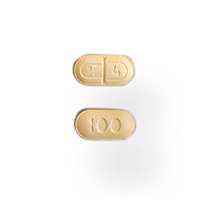Around 20 million Americans have thyroid disease in some form, according to the American Thyroid Association. Female-identifying patients are five to eight times more likely to have hypothyroidism compared to male-identifying patients. You are also more likely to experience it if you are older than 60.
Hypothyroidism

Hypothyroidism is a medical condition where your thyroid gland does not produce enough thyroid hormone. Your thyroid is a butterfly-shaped gland located in the front of your throat. An underactive thyroid can disrupt other important bodily functions, such as your heart rate, body temperature, and metabolism. The thyroid gland produces two main hormones called T4 (thyroxine) and T3 (triiodothyronine). When released by the thyroid gland, T4 is mostly converted to T3, the main hormone responsible for biological effects seen in people.

People Affected
Risk Factors
There are a number of risk factors for hypothyroidism, including:
Family history of thyroid disease
Autoimmune diseases (such as type Hashimoto’s thyroiditis, type 1 diabetes, or celiac disease)
Certain medications (such as radioactive iodine or anti-thyroid medications)
Radiation exposure (especially if you received radiation on your neck or upper chest)
Thyroid surgery
Pregnancy (especially if you gave birth within the last 6 months)
Iodine deficiency
Pituitary disorder
Congenital disease (such as being born with a defective thyroid or no thyroid)
Signs & Symptoms
Symptoms of hypothyroidism tend to develop gradually over years, and they can differ between patients. Common symptoms may include:
Fatigue
Temperature sensitivity
Constipation
Dry skin
Unexplained weight gain
Puffy face
Hoarseness
Sore muscles and joints
Irregular or heavy periods
Depression
Hair loss or dryness
High cholesterol
Irritability
Sexual dysfunction
Slow heart rate
Pharmacist Tip
To help ensure a consistent therapeutic outcome from your thyroid medication, purchase the exact same manufacturer from the pharmacy every time you get a refill. The manufacturer name is included on every prescription label. At a pharmacy such as Honeybee Health it is possible to choose your manufacturer.
Thyroid medication, like levothyroxine, is best taken as a single daily dose, at least ½ to 1 hour before breakfast on an empty stomach.
Try to avoid large amounts of soy, high-fiber foods, iron supplements or multivitamins containing iron, aluminum hydroxide (found in some antacids), and calcium supplements. All of these can interfere with your body’s ability to absorb prescription medication for hypothyroidism. Allow at least 4 hours before or after taking your thyroid medication to consume any of these items.
If you feel that you are more fatigued than normal, have unexplained weight gain, or sensitivities to heat and cold temperatures, then it may be time to get your thyroid levels and blood work evaluated.
Medical Experts
Primary Care Doctor: Your general doctor can diagnose and treat hypothyroidism.
Endocrinologist: Endocrinologists are doctors that specialize in the endocrine system, which includes the thyroid gland. You might see an endocrinologist when you are first diagnosed and until you have found the correct medication dose for your condition. Your primary care doctor might also refer you to one if you have complications or a difficult case of hypothyroidism.
Diagnosis
Typically, a primary care doctor can diagnose hypothyroidism by using blood tests that measure thyroid hormone levels.
Prescription Treatment
Hypothyroidism is typically treated with hormone replacement therapy in the form of prescription medications. Prescription thyroid hormones are either natural or man-made (synthetic). For example, Armour Thyroid or Nature-Throid is derived from beef or pork while synthetic versions of T4 and T3 are more commonly prescribed and less expensive. Levothyroxine (Synthroid, Levoxyl, Levothroid) are all synthetic versions of T4 while liothyronine sodium (Cytomel, Triostat) are the synthetic versions of T3. There is also a synthetic combination of T4/T3 called liotrix (Thyrolar).
Not all generics are the same. Different people respond better to different versions of the same drug, depending on the manufacturer. You can search our website to find the best fit for you.
Lifestyle Remedies
Generally, adopting a healthy lifestyle can help manage some of the symptoms of hypothyroidism. Try to eat healthy and exercise regularly, which can help both with potential weight gain and depression. Aim for consistent sleep as well, since fatigue is another symptom of hypothyroidism and it will be worsened by sleep deprivation.

![Armour Thyroid • [Brand]](https://cdn.honeybeehealth.com/product_units/armourthyroid-tablet-120mg)
![NP Thyroid • [Brand]](https://cdn.honeybeehealth.com/product_units/npthyroid-tablet-120mg-5r0ihkzzt72vyzi0yvylapcxj0ce)
![Synthroid • [Brand]](https://cdn.honeybeehealth.com/product_units/synthroidbrand-tablet-150mcg)